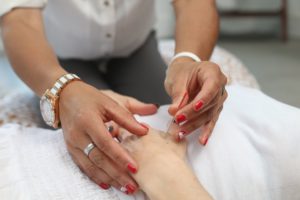
Acupuncture is a medical treatment that involves the use of thin needles that are inserted into the body at very specific locations. Acupuncture is one of the primary components of traditional Chinese medicine, which also includes Chinese herbal medicine, cupping, bodywork, exercise, and dietary therapy.
There are differing theories regarding how acupuncture works. The traditional Chinese explanation explains that acupuncture balances the flow of energies in the body through pathways, also called meridians, creating a balance between yin and yang and all the organs and meridian systems in general. Acupuncture, specifically is the practice of inserting needles into the proper locations (acupuncture points) is believed to alter and rebalance these energy flows.
The Western explanation is a little different. It’s believed that the needles used in acupuncture stimulate muscles, nerves, and connective tissues. The stimulation of needles at certain points releases the body’s natural endorphins, and these endorphins are responsible for a cascade of effects that include pain relief, and that feeling of relaxation and ease we sometimes refer to as an Acu-coma. I like to explain it like assisted meditation or assisted relaxation. Acupuncture is giving your body the extra boost of stress-relieving hormones to help you relax deeper, shut down the sympathetic nervous system response (stress response), and get you into that meditative state easier. In addition, at specific points, muscles can be released via a trigger point or motor point release system and break up adhesions in connective tissue that commonly create pain and dysfunction in the physical body.
Both these ‘theories’ are true, they are just different ways of looking at it, much like a different language, we are saying the same thing but it sounds completely different and can be difficult to understand.
Acupuncture can be a worthwhile treatment option for several conditions, including:
- Nausea associated with chemotherapy and anesthesia. Several studies have demonstrated the effectiveness of acupuncture for managing nausea created by chemotherapy treatment. Post-surgery nausea caused by anesthesia is also positively impacted by acupuncture.
- Rhinitis related to allergies, such as hay fever. Do you suffer from allergies that cause your nose to run? The swelling of mucous membranes due to allergies can be treated with acupuncture. This can be an effective treatment for seasonal allergies without having to resort to medications that often create drowsiness.
- Headaches. Acupuncture can be used to treat a variety of pain, including migraine and other types of headaches. In fact, acupuncture is highly effective in combating headache pain in many sufferers where medication has proven to be ineffective.
- Hypertension. If you suffer from hypertension, you might want to consider giving acupuncture a try. It’s been shown to be mildly to moderately successful in treating a variety of hypertensive ailments.
- Morning sickness. Morning sickness can be highly uncomfortable and inconvenient. Acupuncture can be quite helpful at alleviating morning sickness, nausea, and discomfort and poses no risk to the growing baby.
- Tennis elbow. Tennis elbow can be incredibly uncomfortable and slow to heal. Acupuncture can greatly reduce the pain and the time needed for healing to occur. Acupuncture might take your tennis game to a new level, or at least you’ll be able to spend more time on the court.
- Sprain. In general, sprains respond well to acupuncture. If little else seems to be working, acupuncture can help alleviate the swelling and pain associated with common sprains.
- Menstrual pain. Menstrual discomfort is a serious issue for many women every month. It might be surprising to discover that a few needles in the right place can help with this discomfort, but it can. If you have pain associated with menstrual activity, acupuncture is a possible solution.
Does it hurt? It varies. Most patients report that the insertion of the needle is painless, but there is often a mild ache, numbness, or tingling sensation after the needle reaches its full depth (which is usually very shallow, considering our preconceived understanding of needles and injections otherwise). The needles used in acupuncture are much thinner than those used to give an injection, so the amount of pain is much, much less, and is surprisingly relaxing.
Acupuncture & Chinese medicine has been around for nearly 8,000 years. It shares commonalities with some Ayurvedic medicine principles as well as naturopathic medicine. Acupuncture carries very little risk, and many people are very enthusiastic about the results they receive. Oftentimes, I see people who are at the end of their rope, desperate for relief, and Acupuncture can be miraculous for them.
Curious about what Acupuncture can do for you? The 8 ways in which Acupuncture can benefit you above are only just a handful of documented ways in which Acupuncture has proven it’s worth. If you are interested in all the disorders and ailments that Acupuncture can treat, check out this article, and if you want to learn more about how it works, read more here & here.
Till next time ~ Be well
Erin

